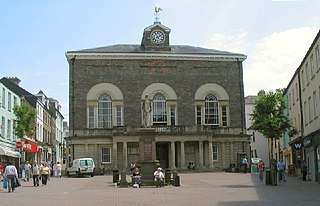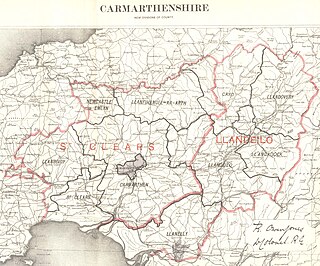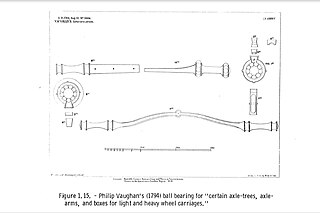Related Research Articles

Carmarthenshire is a county in the south-west of Wales. The three largest towns are Llanelli, Carmarthen and Ammanford. Carmarthen is the county town and administrative centre. The county is known as the "Garden of Wales" and is also home to the National Botanic Garden of Wales.

Earl Cawdor, of Castlemartin in the County of Pembroke, is a title in the Peerage of the United Kingdom. It was created in 1827 for John Campbell, 2nd Baron Cawdor.

Frederick Archibald Vaughan Campbell, 3rd Earl Cawdor,, styled Viscount Emlyn from 1860 to 1898, was a British Conservative politician. He served briefly as First Lord of the Admiralty between March and December 1905.

Kidwelly is a town and community in Carmarthenshire, southwest Wales, approximately 7 miles (11 km) northwest of the most populous town in the county, Llanelli. In the 2001 census the community of Kidwelly returned a population of 3,289, increasing to 3,523 at the 2011 Census.

The River Gwendraeth is a river in Carmarthenshire in West Wales.

John Vaughan, 3rd Earl of Carbery KB, FRS, styled Lord Vaughan from 1643 to 1686, was a Welsh nobleman and colonial administrator who served as the governor of Jamaica between 1675 and 1678.

Earl of Carbery, in the County of Cork, was a title in the Peerage of Ireland. It was created on 5 August 1628 for the Welsh courtier and politician John Vaughan, 1st Baron Vaughan. He had already been created Baron Vaughan, of Mullingar in the County of Westmeath, on 13 July 1621, also in the Peerage of Ireland. He was succeeded by his son, Richard, the second Earl. He fought as a Royalist in the English Civil War. On 25 October 1643 Charles I created him Baron Vaughan, of Emlyn in the County of Carmarthen, in the Peerage of England, which entitled him to a seat in the English House of Lords. His eldest son Francis Vaughan, Lord Vaughan sat as Member of Parliament for Carmarthen but predeceased his father. Lord Carbery was therefore succeeded by his second son, John, the third Earl. He notably served as Governor of Jamaica between 1675 and 1678 and as President of the Royal Society between 1686 and 1689. He had no surviving male issue and the titles became extinct on his death in 1713.

West Carmarthenshire was a parliamentary constituency in Wales which returned one Member of Parliament (MP) to the House of Commons of the Parliament of the United Kingdom.

Richard Vaughan, 2nd Earl of Carbery KB, PC, styled The Honourable from 1621 to 1628 and then Lord Vaughan until 1634, was a Welsh soldier, peer and politician.

Arthur Chichester, 1st Baron Chichester, of Carrickfergus in Ireland, was an English administrator and soldier who served as Lord Deputy of Ireland from 1605 to 1616. He was instrumental in the development and expansion of Belfast, now Northern Ireland's capital. Several streets are named in honour of himself and his nephew and heir Arthur Chichester, 1st Earl of Donegall, including Chichester Street and the adjoining Donegall Place, site of the Belfast City Hall.
John Vaughan, 1st Earl of Carbery was a Welsh courtier and politician who sat in the House of Commons in 1601 and from 1621 to 1622. He served Robert Devereux, 2nd Earl of Essex, and later Prince Charles, heir to the throne of King James I. However, his career ended when the Prince acceded to the throne in 1625, and he later estimated that serving the Prince had cost him £20,000, which went unrecompensed.
This is a list of High Sheriffs of Carmarthenshire. Carmarthenshire was originally created by the Statute of Rhuddlan in 1284. It became an administrative county in 1889 with a county council following the Local Government Act 1888. Under the Local Government Act 1972, the administrative county of Carmarthenshire was abolished on 1 April 1974 and the area of Carmarthenshire became three districts within the new county of Dyfed : Carmarthen, Dinefwr and Llanelli. Under the Local Government (Wales) Act 1994, Dyfed was abolished on 1 April 1996 and the three districts united to form a unitary authority which had the same boundaries as the original Carmarthenshire but remaining in the shrievalty of Dyfed.

Philip Vaughan was a Welsh inventor and ironmaster who patented the first design for a ball bearing in 1794. Vaughan's patent described how iron balls could be placed between the wheel and the axle of a carriage. The balls let the carriage wheels rotate freely by reducing friction.
Sir Henry Vaughan the elder was a Welsh politician who sat in the House of Commons variously between 1621 and 1644. He was a Royalist leader during the English Civil War.

Sir Rhys ap Thomas (1449–1525) was a Welsh soldier and landholder who rose to prominence during the Wars of the Roses, and was instrumental in the victory of Henry Tudor at the Battle of Bosworth. He remained a faithful supporter of Henry and was rewarded with lands and offices in South Wales. Some sources claim that he personally delivered the death blow to King Richard III at Bosworth with his poleaxe.

Court Farm in Pembrey, Carmarthenshire, Wales, is an ancient and formerly imposing manor house which is now an overgrown ruin, but structurally sound, and capable of repair and restoration. It consists of three buildings: the farmhouse, a complex two-storey house of approximately 99 square metres; an adjacent barn; and a later cowshed.
John Fryer was an English physician, humanist and early reformer. He was a Member of the Parliament of England for Portsmouth in 1545.

Kidwelly Priory was a Benedictine abbey in Kidwelly, Wales.
Richard Vaughan MP of Derwydd, Carmarthenshire was a Welsh lawyer and Whig politician who sat in the English and British House of Commons for nearly 40 years from 1685 to 1724.
Arthur Bevan, of Laugharne, Carmarthenshire, was a Welsh lawyer and Whig politician who sat in the House of Commons from 1727 to 1741.
References
- "VAUGHAN, John II (by 1525-74), of Kidwelly, Carmarthen and Golden Grove, Carm". History of Parliament Online. Retrieved 5 July 2013.